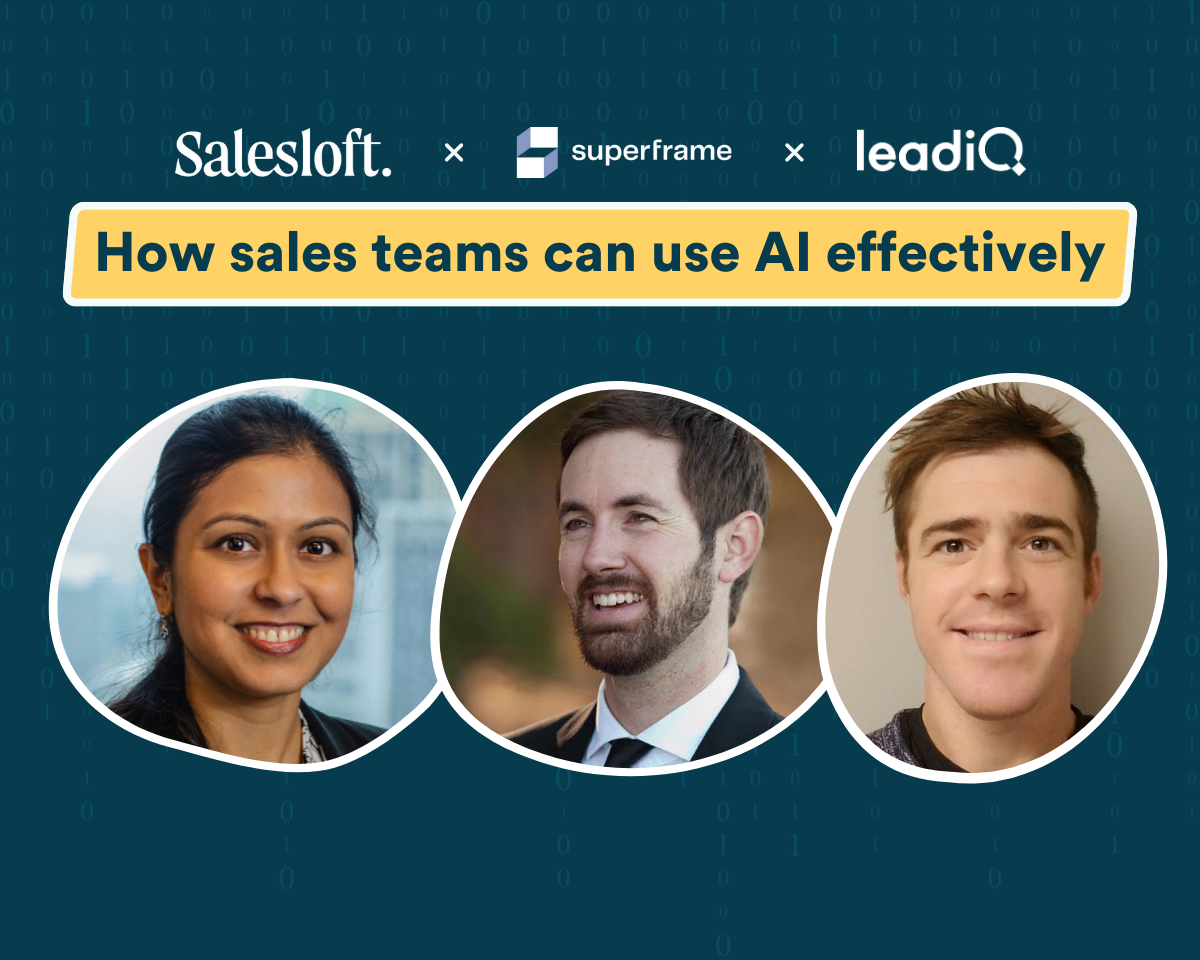Ready to create more pipeline?
Get a demo and discover why thousands of SDR and Sales teams trust LeadIQ to help them build pipeline confidently.





Get a demo and discover why thousands of SDR and Sales teams trust LeadIQ to help them build pipeline confidently.
Unless you’ve avoided the entire internet for the last year, you know how AI has largely dominated the business landscape in 2023.
But while AI is certainly a game-changer, it’s not a panacea; you can’t simply deploy sales AI tools and expect transformative business outcomes.
Getting the best results from AI starts with using the right tools, understanding how to integrate them into your sales tech stack, and mastering prompt engineering to train AI for better results and supercharge your cold outreach and prospecting workflows accordingly.
To help you maximize your investment in AI and accelerate ROI, LeadIQ Director of Demand Generation Jacob Rouser recently hosted a webinar, Mastering AI: The sales AI toolbox for maximum impact, that featured:
Keep reading to learn some of the top tips our panel of experts shared to find out how you can unlock the full potential of AI in sales and win more business because of it.
Rolling out AI across your organization is one thing. But how can you use it to the best of your abilities?
If it’s your first time engaging with AI, it may be hard to figure out where to start. But not to worry: You can always ask the AI to help you learn how to use it effectively.
“It’s going to sound a little bit ridiculous, but I would ask the AI” how to use it, Phil says. “I would tell it who you are, I would tell them what you’re trying to achieve, and I would ask it to brainstorm some ideas. And then if you don’t like them, give it some feedback and continue to iterate on that.”
There’s a learning curve that comes with using any piece of technology. But if you stick with it, AI can become an invaluable tool in your toolbelt.
“It’s like a superpower that everyone has access to,” he explains. “Now you have access to the very best specialists in all categories essentially. So, be curious and don’t be afraid to ask questions and try things. I’ve had the most success when I ask GPT how to structure prompts for GPT.”
ChatGPT and other generative AI tools built on large language models (LLMs) are filled with data. When you give it a generic prompt, the LLM has an enormous amount of data to consider before coming up with an answer to your question — which can lead to imprecise or irrelevant answers
“It’s always good to help it help you,” Sneha says. “When you’re prompting it, something that we like to do is role play with it. Give it a role. Tell it that you are a salesperson selling into manufacturing so that it’s focusing on a specific area of its data and is able to answer from there.”
While generative AI solutions can certainly help sales teams work faster and more productively, they’re not without their challenges. One of the biggest challenges is the fact that tools like ChatGPT are known to hallucinate — i.e., spit out answers that seem like they could be true but have no basis in the real world (e.g., you might have heard of the bogus case law snafu earlier this year)
While everyone is excited about AI right now, Derek sees the business landscape becoming disillusioned by AI hallucinations in the near future.
“I think what we’re going to see is probably six more months of cool stuff coming out,” Derek says. “I think what’s going to happen is the ones that will succeed are the ones where accuracy is not absolutely paramount.”
In other words, if you’re relying on generative AI for research and trusting it entirely, you’re doing it wrong. Instead, you should view AI as a collaboration partner.
“You’re not going to copy and paste the output and send it directly to the customer,” Derek says. “I would never advocate for that because these models do hallucinate. They’re good for the back and forth with you and then you refine what they say before you send it along to a customer. If you’re using these tools, make sure you’re verifying the output.”
As the webinar wrapped up, Jacob asked the panel for a couple of hot takes — including whether they think AI is going to take over sales jobs.
Many professionals are naturally worried about losing their jobs to AI. But the way Derek sees it, AI will certainly change job descriptions but it won’t eliminate positions. Instead, it’ll take away the busy work from the team’s plate and let folks focus on what’s most important.
“SDRs will do something that isn’t necessarily about prospecting or lead generation,” Derek says. “They’ll do something that is a little bit further down the funnel.”
As low-value tasks get removed from the sales team’s plate, does that mean junior positions will be eliminated altogether? Sneha doesn’t think so.
“Maybe the title would go away, but we will have this space for junior folks to come in, learn the profession of sales, contribute in different ways, and then become eventually more senior sellers,” Sneha explains.
The way Phil sees it, AI will replace SDRs, AEs, and SEs, but it’s impossible to be sure when that will happen. While the Industrial Revolution took away lots of manual labor work, the AI revolution will do the same to knowledge workers, according to Phil.
“It’s only a matter of time before [the SDR] role is nothing like it is today,” Phil says. “If you look at the polls right now, people don’t want to interact with salespeople until the very, very, very end — 86% of the way down their buying journey. But if they can talk to somebody that has way more information than your average AE or product expert they’re probably just going to chat with that person. Once [AI has] passed the Turing test and they can’t even tell it’s an AI, then I think we’re all on the chopping block and we’re going to have to find different ways of occupying our time.”
Derek disagreed and had to interject.
“Is AI going to take over everyone’s job?” he asks. “Maybe it could, but it will lose to a human being simply because people like talking to human beings, and if they can identify that there’s not a human being on the other end of the conversation, they will drop it and talk to the company that’s got the human being there. I don’t think we’re going quite that far maybe ever.”
If you’re looking to deploy AI tools for sales, you need to have a smart strategy that ensures your business accomplishes what it intends to by investing in artificial intelligence. And the easiest way to do that is to listen to the experts who are doing it right now and learn what’s working and what isn’t directly from them.
To find out more about how AI tools for sales can help your team get to the next level, watch the full webinar:
Subscribe for updates.